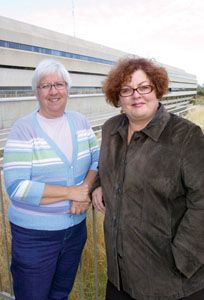Women Scholars Show Support
Dr. Dayna Daniels and Dr. Claudia Malacrida have played key roles in encouraging the Women Scholars group to establish the Women Scholars Award to support graduate students.

"We talk all the time about issues surrounding women, and if we care about ourselves as women, then we need to care about women students as well," says Daniels.
Based on this, Daniels sent an e-mail in the spring to the Women Scholars group asking them if they would be interested in establishing a scholarship. "What was exciting is how quickly the members of the Women Scholars group agreed that it was something worth contributing to. We saw an area that was underrepresented and realized we could do something to help change that," says Daniels.
Dr. Claudia Malacrida (Sociology), also a member of the Women Scholars group, instantly gravitated towards the idea and has worked hard to establish a new Women Scholars Award.
The scholarship, funded through faculty and staff giving, is based on a combination of academic achievement and financial need and is intended to support either female graduate students studying in non-traditional fields or graduate students studying gender-related issues.
Particular consideration will be given to single parents or students returning after an absence.
"Building funds and recognition for graduate students studying gendered areas or non-traditional fields seemed like a natural way to reflect the values of the Women Scholars group," says Malacrida.
Both women feel that it is essential for faculty and staff to actively support scholarships at the University.
"Contributing to scholarships is a way for faculty and staff to show that they support the University in ways that extend beyond their work requirements," says Malacrida.
Daniels explains that receiving a scholarship can be a huge boost to a student's self-esteem and may be the encouragement they need to continue. But as she points out, it's not just a pat on the back, it's also cash in the pocket. While at this point the scholarship is only $500, that money might be used to pay for a student's books or provide child-care funds for a student-mother.
"Being able to pay for those expenses may be the difference for a woman to go to school or not. It takes some of the pressure off financially, and it recognizes some of the specific needs a student might have," says Daniels.
Daniels and Malacrida agree that helping students creates a positive ripple effect and the effects of contributing to scholarships extend well into the future.
"We never know what the potential of our students will be. By providing scholarship money to bright, ambitious graduate students, we help send them on a path that can end almost anywhere. That makes me feel larger and richer for having been a part of it," says Malacrida.
